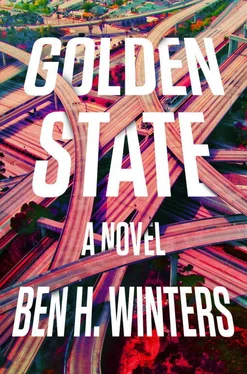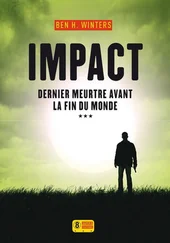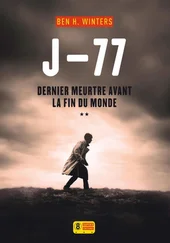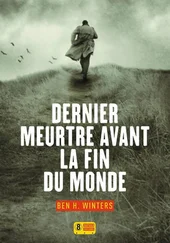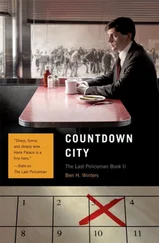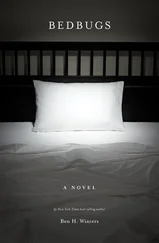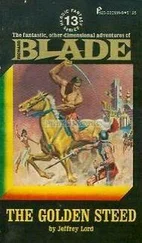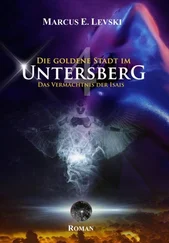“That’s—” My head is shaking. I am shaking my head. “No. No, that’s not right. I didn’t do that. Why would I?”
Arlo turns the page over, and on the back side are a series of photographic stills, taken from the hospitalroom captures. There I am in the pictures. I am standing at Charlie’s bedside. I am crouching at his bedside. I am examining the machines. I am turning the dials.
“I suppose you didn’t know that I knew,” says Arlo, “What you did, I mean. But I have always known, Mr. Ratesic. I have always known what you did.”
“But it’s not—” I find my voice. I say it loud. “That never happened.” Louder. “It’s not So.”
“Come now, Laszlo. It’s on the Record. We’re looking at it.” He puts his fingertips firmly on the photograph. It is black-and-white. My face is distinct. “Look!”
“Why?” I look at Arlo, my face hot with grief. “Why did I do that?”
“You were jealous of Charlie. You had always been jealous, and now—well now, the man had become a genuine hero. The greatest hero the State has ever produced. You couldn’t bear it, Laszlo. I am absolutely sympathetic, I have always been so. Which is why I have kept my silence for all these years.”
“Oh.”
I turn the page over and over again, the words on the front and the pictures on the back, turn them over and over, as if I can shake the letters and the images right off the paper, make it all go away, but it won’t go away, because it is true. I remember it now. I spent these years unremembering it but now it is coming back, rushing back, grabbing at me, clutching at my heels like speculation: the bitter sting of envy I felt in Charlie’s presence, the hatred for him that seethed below the surface of my adoration. How easy it suddenly seemed to be done with those feelings. Done with him, done with him forever . I remember the bitter smell of the room, the beep of those machines, how easy it would be, how easy it was.
“Oh fuck, Arlo. Oh no.” I tilt back from the table and turn my face away from him in the dim light of the Record and weep at what I did, at what I am. “Oh no.”
“It will be all right.” Arlo rises, comes over to my side of the review desk, and lays a hand down on top of mine while with the other hand he gently strokes my woolly head. “It will be okay. Look, Laszlo. Look.”
There is another CSE on the table, beside the first one. I lean forward, baffled, pushing tears out of my eyes with my thick fingers. It is the same file, the same blue, the same label. Exactly the same. “The Death of Mr. Charles Ratesic of the Speculative Service.”
“What?” I say. “What is this?”
“This is the file that lives here, On the Record. It is a forgery, Laszlo.” “Forgery”: old word, dead word. The word itself an artifact. “The file that you just read—that one”—he points at the first file, the one in which Laszlo Ratesic betrays his beloved brother—“ this file has lived for all these years at my home, Laszlo. I could not bring myself to destroy a piece of the Record, but it does not live here. And I replaced it with this one.”
He lifts this second file and places it on top of the first one, hiding the first from view. We sit in the silence of the enormity of this crime of forgery, of purposefully removing truth from the Record and replacing it with false. Rewriting the Record. A grave assault upon the truth. And for what? For me . I flip open this second file. It tells the story that I knew and have known for the last decade, the story I have long taken for truth. It shows how Charlie was gravely injured in the raid, how he struggled to survive for days and then weeks, how the doctors were able to stabilize but never reverse the course of the opportunistic infections that ultimately claimed his life. There is no murder in this file. No envious Laszlo, tampering with the dials. The man was wounded, and then he died from his wounds. A martyr.
“I replaced this file”—Arlo lifts a corner of the new file, gives a quick furtive glimpse of the old one before covering it again—“with this. Because I believed that we would be better off with you in the world than not in it. To defend our world and protect it. Especially with Charlie gone. I made that call. I made that decision.”
“Oh, Arlo. Thank you.” I reach out across the table, new tears on my cheeks, and I grab his shoulders, push my forehead against his. “Thank you.”
He pulls from my grasp. He stares at me. His eyes behind his glasses are dark with sadness.
“I cannot believe it,” Arlo says softly, his voice a weary rasp. “Every time I see it I still cannot believe it.”
“Believe—” I peer at him. “Believe what?”
“You saw it, didn’t you? In your mind. You saw yourself murdering your brother. It was true inside your heart, that you killed the one person you love more than anyone in the world. Oh, Laszlo. I have spent a melancholy lifetime contemplating the impermanence of reality, and yet I am constantly stunned anew.”
With precise deliberate movements, Arlo picks up the forged file and then he picks up the real one—and yet another file is revealed. This is how I do it, of course, how he taught me to do it, lining up the paper, getting everything in order, revealing one fact at a time. And this new file is the same again, the same CSE a third time through: “The Death of Mr. Charles Ratesic of the Speculative Service.”
I look at Arlo. I look at the file. I open it.
Murder again. The text and the pictures together tell the story: Charlie, incapacitated and vulnerable, is defenseless against the stealthy approach of the monster… except the monster is Arlo. It is Arlo Vasouvian who lurks at the bedside, Arlo Vasouvian who crouches, and then Arlo Vasouvian with the dials in his hands.
Memories drop out of my head. The truth reverses itself, scrambles and reforms. I pick up my gun again. Arlo leans back and stares at me, not like a friend now. Like a scientist, examining, considering. I raise the gun and he does not flinch. Around us hangs the solemn stillness of the Record.
“That file is the real one,” I say.
“Yes.”
“You killed Charlie.”
“I did.” Arlo, blood-splattered, gentle-eyed, stares back at me evenly. “That’s correct. That is accurate. To the extent that that word owns a definition.” The three blue files are still on the desk, and now, as he talks, Arlo shifts them around, places a palm down on one and moves it in an idle circle, then does the same with the others, rearranging and rearranging their places, shuffling and reshuffling their order. “He was good at his job. Very good. I never thought—” He shakes his head in wonderment. “Never for a moment did I think that his undercover operation would be a success, but as you know, it was. With long effort and clever skill he destroyed nearly all we had built, and he had found nearly every member of our Golden State. As it was constituted, I should say, at that time. I could not let him find me too. He was, as you know, a very talented man.”
“Arlo Vasouvian,” I say, summoning the voice I need, “you are under arrest.”
“No,” he says, “I’m not.”
“You just confessed. It’s all—” I look around the room, gesturing up at the captures. “It’s all on the Record.”
“Oh, right. The Record. Inviolable. Impregnable.” He sighs. “You’re not listening, Mr. Ratesic. Or you’re listening but wishing not to hear.” His hands pause in their endless rotations. He picks the file that was on the top, flips it open. It’s me, in the photograph, me crouched to the dials.
“But that’s not—”
“Real!” He stands abruptly and snarls, contorted with contempt. “Would you stop it? Would you stop? With ‘ real’ and ‘ not real , ’ ‘ fake’ and ‘ not fake , ’ ‘ true’ and ‘ not true .’ Stop!” He sweeps all three files from the desk and rushes out of the room.
Читать дальше
